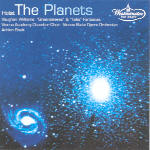This callow, boxy reissue of a 1959 recording on Westminster ought never to have been produced. It’s a cheap performance of a work that requires both delicacy and strength. Adrian Boult fails to convince the Vienna State Opera Orchestra (which is not the pit band version of the Vienna Philharmonic) that one note of this piece has anything to do with the next. Instead, the musicians plod along, playing reasonably in tempo and even more questionably in tune, as if recording were an obligation requiring desultory attention. The orchestra does manage to rally a bit for the Andante maestoso section of Jupiter. But come on, anyone could rally for that section; it’s lush and simple, allowing the conductor a chance to “emote”. Faithfulness to the score seems to be a matter of convenience for Boult, who adds rubato pell-mell but ignores many of Holst’s crescendos, preferring cheap subitos that the composer never wanted. If you make it to the end of Mars, you will be treated to one of the most flaccid quintuple-fortes ever.
The main problem here is balance, or the lack thereof. Some things sound in your face (any of the concertmaster solos) and others sound as if they were taped in a separate studio and overlaid–the horns, for instance. The group never comes together as a cohesive unit, especially in the lighter, more delicate sections of Venus that demand an intimate, chamber-music-like approach. Melodies often are subsumed by what is clearly figuration–this happens to an almost criminal extent just before number VI in Jupiter–until the opposite happens and elements designed to give a background texture are lost altogether. There are recordings of this piece by this same conductor that are indeed spectacular, so why this one ever saw the light of day is a little baffling. It is not even interesting or mistake-ridden enough (aside from a few obvious splices) to be a fun “how-bad-is-this” disc for audiophile gatherings.
The performances of the Vaughan Williams Fantasias are a little better, but then again these are easier pieces to put together. Overall the renditions are inoffensive, but that is not (nor should it ever be) meant as praise. Once again, notes come after notes with little sense of line or flow, coaxing the vanilla out of some otherwise lush and beautiful melodies, offering more an audio schematic of the pieces than a proper performance.
































